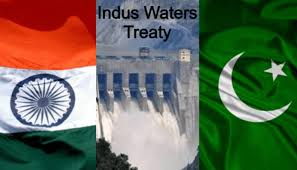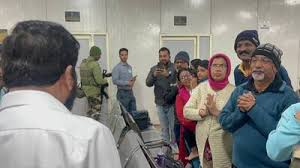
Pakistan will struggle for water; India's 5 decisions will bring Pakistan to its knees
India's Actions On Pakistan: 26 tourists have lost their lives in the terrorist attack in Pahalga. After this attack, India has started taking strict steps against Pakistan. It has started putting political pressure on Pakistan by taking five major decisions against Pakistan. The decisions of the Indian government are going to put Pakistan in a dilemma.
India has suspended the Indus Water Treaty, banned Indian visas for Pakistani citizens, ordered Pakistani embassies to leave India, Attari Wagah border will remain closed till May 1, and ordered the closure of the Pakistani High Commission in India. Let's know in detail what impact this will have on Pakistan.
Indus Water Treaty suspended
In 1960, India and Pakistan signed the Indus Water Treaty for the sharing of water of the Indus River. The World Bank was the mediator in this agreement. This agreement was signed by Indian Prime Minister Jawaharlal Nehru and Pakistani President Ayub Khan on September 19, 1960 in Karachi. According to this treaty, the western rivers of the Indus region, namely Indus, Jhelum and Chenab, have been given to Pakistan, while the eastern rivers, namely Ravi, Beas and Sutlej, have been given to India. India is allowed to use the western rivers for irrigation, power generation and transport to a limited extent. While doing this, India has to take care that there is no major impact on the water flowing to Pakistan. 90 percent of Pakistan's agriculture depends on it and drinking water comes from the Indus River basin.
Suspending this treaty will allow India to use the Indus River and its tributaries without limits, which could lead to water shortages in Pakistan. This could affect Pakistan's agriculture and reduce food production. India can build new hydroelectric power plants, and can also block or release water at will. India has never previously suspended or terminated this treaty. However, suspending the Indus Water Treaty could lead to water shortages for Pakistan.
Attari border closed
India has announced the closure of the Attari border from May 1. Those who have crossed the border legally can return through that route before May 1. The Attari-Wagah border is a major hub for road trade between India and Pakistan. Even after India withdrew the Most Favored Nation status given to Pakistan in 2019 and severed trade ties, some goods like fresh fruits, cement and tomatoes were imported and exported through the border. However, the closure of this check post will affect the import of tomatoes, sugar, tea and other essential commodities from India into Pakistan. This may increase the prices of these goods there. This will be a big blow for Pakistan.
Order to Pakistani diplomats to leave India
India has given a week's time to the Pakistani embassy to leave India. Five assistant staff of service advisors will also be recalled from both high commissions. New Delhi will also recall such advisors from the Indian High Commission in Islamabad. This will make Pakistan suffer international humiliation. The stigma of being a terrorist country will deepen. Therefore, many countries will keep their distance from Pakistan. Suspected of being a terrorist, its citizens will face difficulties in obtaining visas to other countries. Foreign investment in Pakistan will also be affected.
Pakistan High Commission in India to be closed
The total number of employees in the Pakistan High Commission in India will be reduced from the current 55 to 30. This will increase diplomatic pressure on Pakistan. Pakistan is helping terrorists through the High Commission. Apart from this, it is funding anti-India people in various ways. Now due to the shortage of these employees, its misdeeds will be reduced. Moreover, they will also have to face humiliation at the international level.
Cancellation of SAARC visas for Pakistani citizens
Pakistani citizens will no longer be allowed to travel to India through the SAARC Visa Exemption Scheme (SVES). Any SVES visa issued to Pakistani citizens earlier will be considered cancelled. Any Pakistani citizen who is in India under SVES visa has been given 48 hours to leave India. This will now create difficulties for Pakistanis who want to come to India. He will no longer be able to get a visa. Under this visa, Pakistani dignitaries, high court judges, MPs, senior officials, businessmen, journalists and sportspersons were exempted from the requirement of visas and other travel documents. This high profile class in Pakistan used to fulfill many of their needs, including medical treatment, on a large scale. Now they will all blame the Pakistani government for this.
India's Actions On Pakistan: 26 tourists have lost their lives in the terrorist attack in Pahalga. After this attack, India has started taking strict steps against Pakistan. It has started putting political pressure on Pakistan by taking five major decisions against Pakistan. The decisions of the Indian government are going to put Pakistan in a dilemma.
India has suspended the Indus Water Treaty, banned Indian visas for Pakistani citizens, ordered Pakistani embassies to leave India, Attari Wagah border will remain closed till May 1, and ordered the closure of the Pakistani High Commission in India. Let's know in detail what impact this will have on Pakistan.
Indus Water Treaty suspended
In 1960, India and Pakistan signed the Indus Water Treaty for the sharing of water of the Indus River. The World Bank was the mediator in this agreement. This agreement was signed by Indian Prime Minister Jawaharlal Nehru and Pakistani President Ayub Khan on September 19, 1960 in Karachi. According to this treaty, the western rivers of the Indus region, namely Indus, Jhelum and Chenab, have been given to Pakistan, while the eastern rivers, namely Ravi, Beas and Sutlej, have been given to India. India is allowed to use the western rivers for irrigation, power generation and transport to a limited extent. While doing this, India has to take care that there is no major impact on the water flowing to Pakistan. 90 percent of Pakistan's agriculture depends on it and drinking water comes from the Indus River basin.
Suspending this treaty will allow India to use the Indus River and its tributaries without limits, which could lead to water shortages in Pakistan. This could affect Pakistan's agriculture and reduce food production. India can build new hydroelectric power plants, and can also block or release water at will. India has never previously suspended or terminated this treaty. However, suspending the Indus Water Treaty could lead to water shortages for Pakistan.
Attari border closed
India has announced the closure of the Attari border from May 1. Those who have crossed the border legally can return through that route before May 1. The Attari-Wagah border is a major hub for road trade between India and Pakistan. Even after India withdrew the Most Favored Nation status given to Pakistan in 2019 and severed trade ties, some goods like fresh fruits, cement and tomatoes were imported and exported through the border. However, the closure of this check post will affect the import of tomatoes, sugar, tea and other essential commodities from India into Pakistan. This may increase the prices of these goods there. This will be a big blow for Pakistan.
Order to Pakistani diplomats to leave India
India has given a week's time to the Pakistani embassy to leave India. Five assistant staff of service advisors will also be recalled from both high commissions. New Delhi will also recall such advisors from the Indian High Commission in Islamabad. This will make Pakistan suffer international humiliation. The stigma of being a terrorist country will deepen. Therefore, many countries will keep their distance from Pakistan. Suspected of being a terrorist, its citizens will face difficulties in obtaining visas to other countries. Foreign investment in Pakistan will also be affected.
Pakistan High Commission in India to be closed
The total number of employees in the Pakistan High Commission in India will be reduced from the current 55 to 30. This will increase diplomatic pressure on Pakistan. Pakistan is helping terrorists through the High Commission. Apart from this, it is funding anti-India people in various ways. Now due to the shortage of these employees, its misdeeds will be reduced. Moreover, they will also have to face humiliation at the international level.
Cancellation of SAARC visas for Pakistani citizens
Pakistani citizens will no longer be allowed to travel to India through the SAARC Visa Exemption Scheme (SVES). Any SVES visa issued to Pakistani citizens earlier will be considered cancelled. Any Pakistani citizen who is in India under SVES visa has been given 48 hours to leave India. This will now create difficulties for Pakistanis who want to come to India. He will no longer be able to get a visa. Under this visa, Pakistani dignitaries, high court judges, MPs, senior officials, businessmen, journalists and sportspersons were exempted from the requirement of visas and other travel documents. This high profile class in Pakistan used to fulfill many of their needs, including medical treatment, on a large scale. Now they will all blame the Pakistani government for this.

.jpg)
















